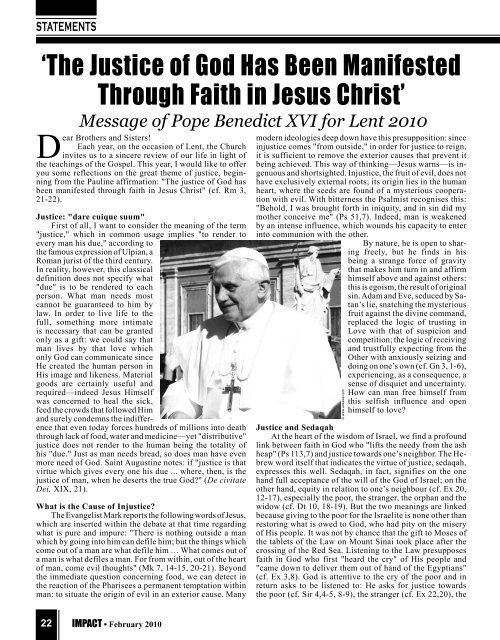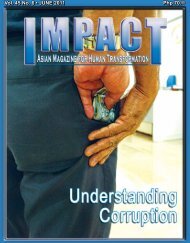Download - IMPACT Magazine Online!
Download - IMPACT Magazine Online!
Download - IMPACT Magazine Online!
Create successful ePaper yourself
Turn your PDF publications into a flip-book with our unique Google optimized e-Paper software.
STATEMENTS<br />
‘The Justice of God Has Been Manifested<br />
Through Faith in Jesus Christ’<br />
Message of Pope Benedict XVI for Lent 2010<br />
Dear Brothers and Sisters!<br />
Each year, on the occasion of Lent, the Church<br />
invites us to a sincere review of our life in light of<br />
the teachings of the Gospel. This year, I would like to offer<br />
you some reflections on the great theme of justice, beginning<br />
from the Pauline affirmation: "The justice of God has<br />
been manifested through faith in Jesus Christ" (cf. Rm 3,<br />
21-22).<br />
Justice: "dare cuique suum"<br />
First of all, I want to consider the meaning of the term<br />
"justice," which in common usage implies "to render to<br />
every man his due," according to<br />
the famous expression of Ulpian, a<br />
Roman jurist of the third century.<br />
In reality, however, this classical<br />
definition does not specify what<br />
"due" is to be rendered to each<br />
person. What man needs most<br />
cannot be guaranteed to him by<br />
law. In order to live life to the<br />
full, something more intimate<br />
is necessary that can be granted<br />
only as a gift: we could say that<br />
man lives by that love which<br />
only God can communicate since<br />
He created the human person in<br />
His image and likeness. Material<br />
goods are certainly useful and<br />
required—indeed Jesus Himself<br />
was concerned to heal the sick,<br />
feed the crowds that followed Him<br />
and surely condemns the indifference<br />
that even today forces hundreds of millions into death<br />
through lack of food, water and medicine—yet "distributive"<br />
justice does not render to the human being the totality of<br />
his "due." Just as man needs bread, so does man have even<br />
more need of God. Saint Augustine notes: if "justice is that<br />
virtue which gives every one his due ... where, then, is the<br />
justice of man, when he deserts the true God?" (De civitate<br />
Dei, XIX, 21).<br />
What is the Cause of Injustice?<br />
The Evangelist Mark reports the following words of Jesus,<br />
which are inserted within the debate at that time regarding<br />
what is pure and impure: "There is nothing outside a man<br />
which by going into him can defile him; but the things which<br />
come out of a man are what defile him … What comes out of<br />
a man is what defiles a man. For from within, out of the heart<br />
of man, come evil thoughts" (Mk 7, 14-15, 20-21). Beyond<br />
the immediate question concerning food, we can detect in<br />
the reaction of the Pharisees a permanent temptation within<br />
man: to situate the origin of evil in an exterior cause. Many<br />
modern ideologies deep down have this presupposition: since<br />
injustice comes "from outside," in order for justice to reign,<br />
it is sufficient to remove the exterior causes that prevent it<br />
being achieved. This way of thinking—Jesus warns—is ingenuous<br />
and shortsighted. Injustice, the fruit of evil, does not<br />
have exclusively external roots; its origin lies in the human<br />
heart, where the seeds are found of a mysterious cooperation<br />
with evil. With bitterness the Psalmist recognises this:<br />
"Behold, I was brought forth in iniquity, and in sin did my<br />
mother conceive me" (Ps 51,7). Indeed, man is weakened<br />
by an intense influence, which wounds his capacity to enter<br />
into communion with the other.<br />
By nature, he is open to sharing<br />
freely, but he finds in his<br />
being a strange force of gravity<br />
that makes him turn in and affirm<br />
himself above and against others:<br />
this is egoism, the result of original<br />
sin. Adam and Eve, seduced by Satan’s<br />
lie, snatching the mysterious<br />
fruit against the divine command,<br />
replaced the logic of trusting in<br />
Love with that of suspicion and<br />
competition; the logic of receiving<br />
and trustfully expecting from the<br />
Other with anxiously seizing and<br />
doing on one’s own (cf. Gn 3, 1-6),<br />
experiencing, as a consequence, a<br />
sense of disquiet and uncertainty.<br />
How can man free himself from<br />
this selfish influence and open<br />
himself to love?<br />
© www.ankawa.com<br />
Justice and Sedaqah<br />
At the heart of the wisdom of Israel, we find a profound<br />
link between faith in God who "lifts the needy from the ash<br />
heap" (Ps 113,7) and justice towards one’s neighbor. The Hebrew<br />
word itself that indicates the virtue of justice, sedaqah,<br />
expresses this well. Sedaqah, in fact, signifies on the one<br />
hand full acceptance of the will of the God of Israel; on the<br />
other hand, equity in relation to one’s neighbour (cf. Ex 20,<br />
12-17), especially the poor, the stranger, the orphan and the<br />
widow (cf. Dt 10, 18-19). But the two meanings are linked<br />
because giving to the poor for the Israelite is none other than<br />
restoring what is owed to God, who had pity on the misery<br />
of His people. It was not by chance that the gift to Moses of<br />
the tablets of the Law on Mount Sinai took place after the<br />
crossing of the Red Sea. Listening to the Law presupposes<br />
faith in God who first "heard the cry" of His people and<br />
"came down to deliver them out of hand of the Egyptians"<br />
(cf. Ex 3,8). God is attentive to the cry of the poor and in<br />
return asks to be listened to: He asks for justice towards<br />
the poor (cf. Sir 4,4-5, 8-9), the stranger (cf. Ex 22,20), the<br />
22<br />
<strong>IMPACT</strong> • February 2010
















